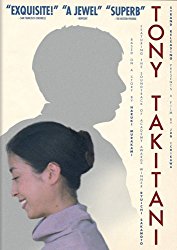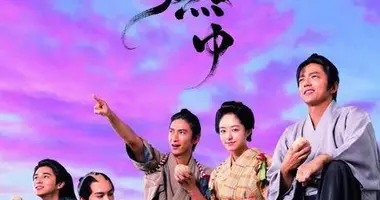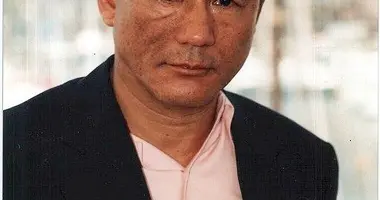Tony Takitani
- Published on : 25/12/2012
- by : Japan Experience
- Youtube
Tony Takitani
Tony Takitani
by Joe Sinclair, June 2006

Skewed a few degrees away from reality, this is a trancelike film.
Tony Takitani is based on a short story by the surrealist author Haruki Murakami, and the film captures the mix of playful melancholy in his books.
Tony, played by Issey Ogata (A One and a Two, Otoko wa Tsurai yo), is a mechanical illustrator. He grew up alone, with his mother dead and his father on tour with his jazz band.
Tony channels himself into his work, producing scrupulously detailed pictures of machines.
He lives in a spacious apartment on a hill high above an unnamed city. With each scene the camera pans slowly from left to right, unraveling the story like a Japanese scroll as life passes by.
Tony is frequently seen alone in his apartment, framed by a giant window or doorway, creating an almost vertiginous sense of space. We see the world beyond, visible but out of reach, reflecting Tony's quiet isolation.
But it is Tony's inner emptiness on which the film lingers. "I never thought I was especially lonely," he says at the beginning of the film. And it is this lack of awareness that makes his loneliness more poignant.
It is only when Tony meets and then marries Eiko, played by Rie Miyazawa (The Twilight Samurai), that he even begins to understand and fear his own solitude.
Eiko is young and beautiful but, like her husband, there is something lacking with her. She fills her days shopping for expensive designer clothes and soon the spare room needs to be converted into a wardrobe.
At first Eiko's relationship with her wardrobe is a mysterious attraction for Tony. "I've never met anyone who inhabits her clothes with such obvious relish as you do," he tells her.
But after they are married her compulsive buying begins to disturb him, and when he asks her to economize there are disastrous consequences.
This is a slow, dreamlike film, driven by its own atmosphere rather than plot.
The off-kilter piano score by Ryuichi Sakamoto (Merry Christmas Mr Lawrence, The Last Emperor) is a melancholy lullaby. And the washed out colors add to the film's fable-like quality.
An extensive third person narration distances the audience further from the story. And the actors intersperse the voiceover by occasionally talking directly to the audience. This playful touch helps keep the mood from becoming too oppressive and also draws the audience into the film.
The narration starts: "Tony Takitani's real name was... It really was Tony Takitani", undercutting mystery with reality. Both Ichikawa and Murakami capture the bathos of the human condition.
Tony's Western name, given to him on a whim by his father, was also one of the reasons why he became isolated, unable to make friends at school.
Both Ogata and Miyazawa play two roles, doubling up as Tony's father and a young girl looking for work. This builds on the atmosphere of uncanny otherworldliness. And the acting is first rate.
Ogata's slow movements and vacant face portray Tony perfectly. When Eiko's ex-boyfriend accuses him of being "dull" he is probably right, but Tony still manages to capture the sympathies of the audience.
Meanwhile Miyazawa plays Eiko with troubling calm, belying her own complex real-life character. Half Japanese, half Dutch, she was once engaged to sumo champion Takanohana. But the wrestler's father had things broken off and after the breakup Miyazawa attempted suicide, struggling with anorexia and alcoholism.
Murakami (Norwegian Wood, The Wind-up Bird Chronicle, A Wild Sheep Chase) rarely allows film adaptations of his novels. It is easy to see why: to capture Murakami's floating worlds is not an easy task.
But director Jun Ichikawa manages to evoke a powerful emotional response, and despite their quirkiness - or even because of it - the characters are profoundly human.
When Tony is left alone once more we see him huddled in the windowless wardrobe-room, with the full weight of his loneliness baring down.
It is the sub-characters who anchor the film in a more recognizable reality. But they too are struggling with their own emptiness, and you may be left wondering what the point is of the film and of life in general.
But this is a film that asks more questions than it answers.
The film lasts only seventy-five minutes. There is not much action. The ending resolves little. But if you sit back and soak up the atmosphere it will linger hauntingly in your mind well after the final credits roll.
Also by Joe Sinclair
Hitch-Hiking in Japan
Japan Travel Tips: Missing the last train in Tokyo
Hot Spring Bathing in Japan
Tokyo Story - Movie Review
Memoirs of a Geisha - Movie Review
Tony Takitani - Movie Review
Twilight Samurai - Movie Review
Fear And Trembling (Stupeur et Tremblements) - Movie Review
The Fog of War - Movie Review
Zatoichi- Movie Review
Interview with David Mitchell, author of "Cloud Atlas"
Books on Japan
Tony Takitani: read a review of the movie Tony Takitani based on the book by Haruki Murakami and directed by Jun Ichikawa, starring Issey Ogata, Rie Miyazawa and score by Ryuichi Sakamoto .









